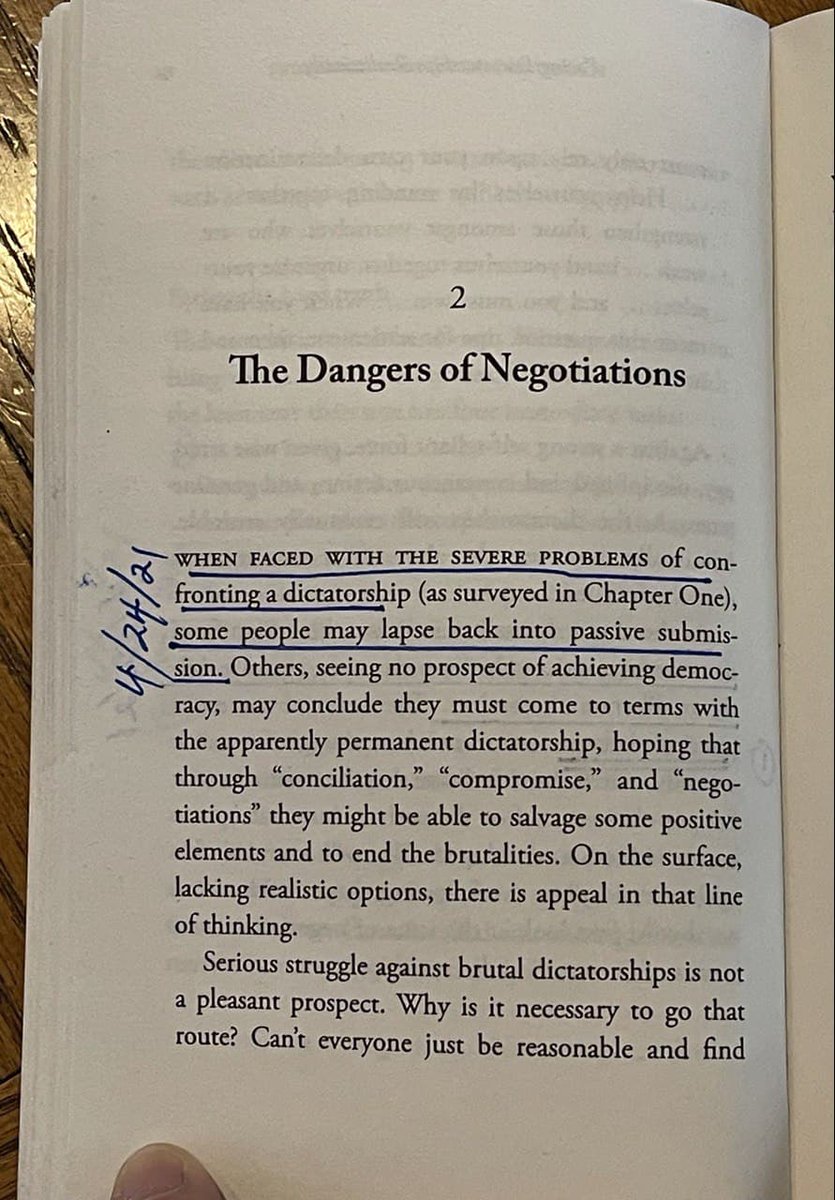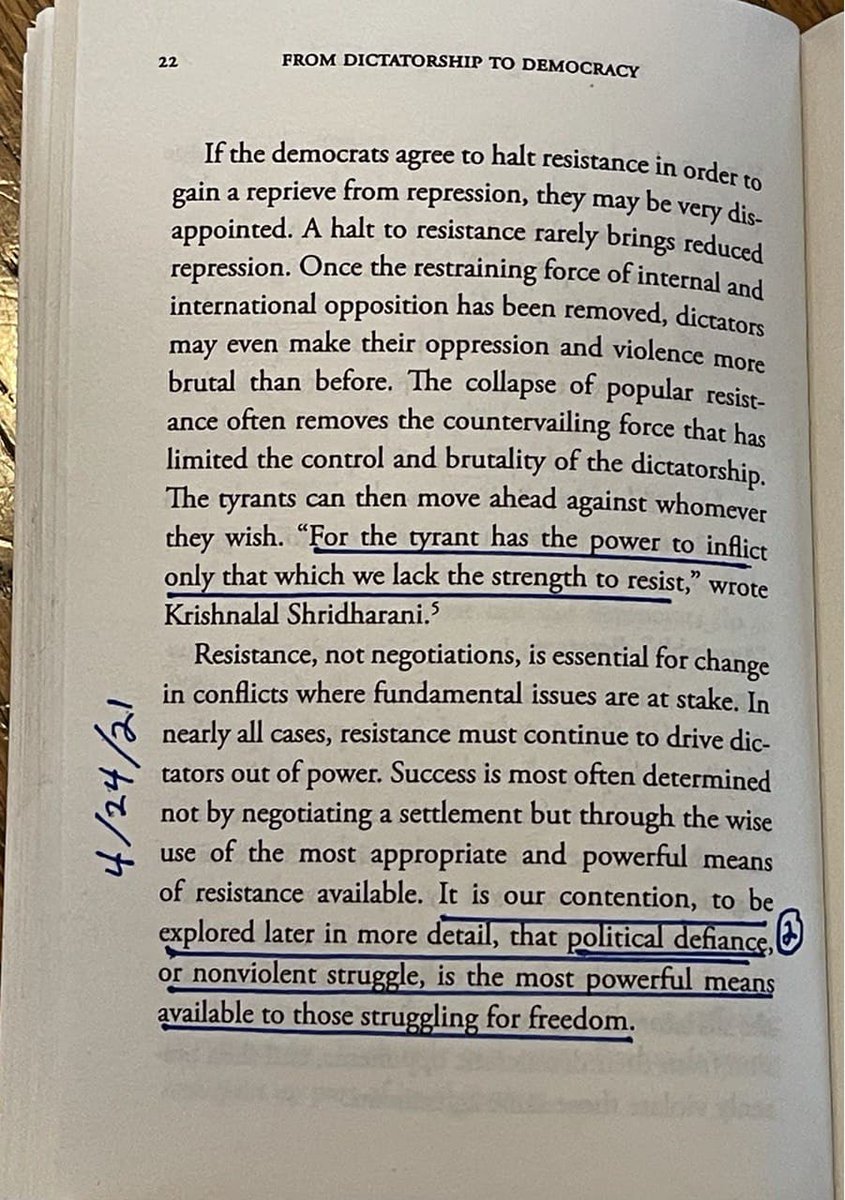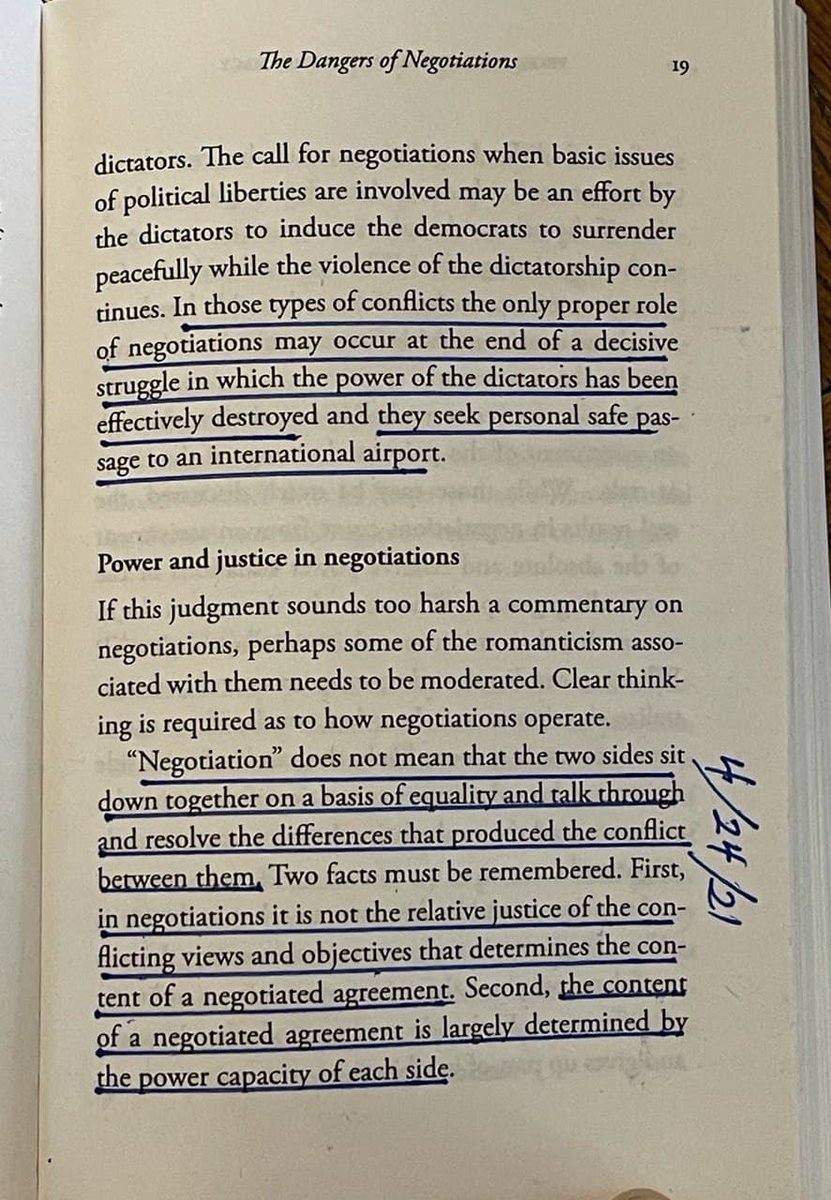24 April 2021 #MAGAanalysis
FDTD – Chapter 2: The Dangers of Negotiations
I& #39;d have named this chapter differently. I& #39;d have called it:
The Strengths, Weaknesses, & Power of Negotiation
Names aside, this chapter is one of the finest presentations on negotiation I& #39;ve read.
FDTD – Chapter 2: The Dangers of Negotiations
I& #39;d have named this chapter differently. I& #39;d have called it:
The Strengths, Weaknesses, & Power of Negotiation
Names aside, this chapter is one of the finest presentations on negotiation I& #39;ve read.
2) I can, however, make his case for the title he chose. Let me put the danger like so:
When Negotiation = Capitulation...DON& #39;T DO IT!
For Sharp, political freedom is the greatest treasure in this world. It demands fierce commitment and readiness to make sacrifice.
When Negotiation = Capitulation...DON& #39;T DO IT!
For Sharp, political freedom is the greatest treasure in this world. It demands fierce commitment and readiness to make sacrifice.
3) My own case is this. Every form of combat or cooperation entails negotiations, whether we call them that or not. I say that if we& #39;re bold enough to embrace non-violent, legal, political resistance, then we can trust ourselves to negotiate without capitulation.
4) Alas, his first point in this chapter is so spot on, I likely have to surrender to his tone. People, after fighting, often revert back into passive submission, and often, the place that occurs is in the negotiation process. He is just so right about that.
5) On page 19, Sharp gives us a righteous example, and for him, the ONLY righteous example of negotiation with dictators. How can we organize safe passage to an international airport for you? That is a conversation Sharp embraces with his whole heart and soul.
6) Let& #39;s look at page 19 in full. Only on my second reading, I don& #39;t recall if there is an equal moment anywhere else in his book. But on this page, we have caution that rises to the very level of Machiavelli.
7) Negotiation with a dictator does not turn on Truth, Justice, the American Way, or by any other valued good. It turns on the balance of power capacity, as Sharp calls it. Which side has greater power? That is the ultimate factor driving negotiation outcomes. Period.
8) Sharp does not use the word "naive." I do. The real basis of negotiation weakness is the failure to recognize power as the pivotal component. I have an anecdote to share on point. It& #39;s about one of recruiting clients who once negotiated with Donald Trump and lost.
9) My client had the perfect candidate for an opening in the Trump outfit, and at the stage of making an offer, they met to discuss the next steps. Trump said, I& #39;m ready to hire your candidate but I will not pay your full fee. Half of your fee is the highest I& #39;ll go.
10) My client buckled and cut her fee in half in order to close the deal. When she told me about this, she was explaining how she hated Trump because that was such an unfair thing to do. So, I asked her, why didn& #39;t you walk about of the negotiation? Why not just hold fast?
11) Honorably, she felt that this was in fact the best job her candidate would find. Also, even at half her fee, the raw dollars were too appealing to walk away from. She capitulated and was happy, but yet she still hated Trump for his unfair tactics.
12) Had I been coaching her at the time I& #39;d have counseled walk away. You don& #39;t know if Trump will pay full fee or not if you capitulate. You don& #39;t know if he& #39;d accept a 90% fee offer from you, or anything north of the 50% you accepted. This was a dangerous negotiation, indeed.
13) We might call it the Sharp/Trump Doctrine that many times:
The best deal of all is...NO DEAL.
If you don& #39;t have the strength to walk away, you really aren& #39;t negotiating. You& #39;re capitulating but likely not calling it that.
The best deal of all is...NO DEAL.
If you don& #39;t have the strength to walk away, you really aren& #39;t negotiating. You& #39;re capitulating but likely not calling it that.
14) Following Sharp& #39;s view of danger, he teaches us that dictators are always violent, and have control of the weapons of the state at his disposal. The only answer to this disparity is non-violent resistance. For the non-violent negotiator to win, this must be understood.
15) Sharp give us this quote: "For the tyrant has the power to inflict only that which we lack the strength to resist." You can find the quote on page 264 of this free book. It& #39;s powerful material.
https://archive.org/details/in.ernet.dli.2015.36471/page/n263/mode/2up?q=only+that+which">https://archive.org/details/i...
https://archive.org/details/in.ernet.dli.2015.36471/page/n263/mode/2up?q=only+that+which">https://archive.org/details/i...
16) This is an absolutely PERFECT description of exactly HOW we lost America to its enemies within. We walk into the negotiating room unprepared, oblivious of our own weaknesses, equally oblivious of our opponent& #39;s strengths. Now that& #39;s dangerous and we see the results, today.
17) Let& #39;s look at Sharp& #39;s caution another way. Political Defiance is:
THE MOST POWERFUL MEANS AVAILABLE TO THOSE STRUGGLING FOR FREEDOM.
What he& #39;s telling is that weak negotiations always occur in the context of a failure of political will, the will required to defy the enemy.
THE MOST POWERFUL MEANS AVAILABLE TO THOSE STRUGGLING FOR FREEDOM.
What he& #39;s telling is that weak negotiations always occur in the context of a failure of political will, the will required to defy the enemy.
18) The great point of this chapter is that there ARE other options for those who want BOTH peace AND freedom. He warns us that negotiations are, essentially the surrender of the very weapon that empowered us in the first place:
Legal, Non-violent Political Defiance.
Legal, Non-violent Political Defiance.
19) I can hear you asking, but what about evil laws and the Civil Disobedience that our morality demands of us? In a word, Political Defiance can incorporate what the state calls illegal when the law dictates wrong action. An example can easily be found from our Civil War.
20) So much of the debate leading up to open hostilities revolved interstate travel with one& #39;s slaves, as well as the policies of free states in response to escaped slaves and their return to their masters. Our Underground Railroad was 100% illegal AND 100% righteous, both.

 Read on Twitter
Read on Twitter






